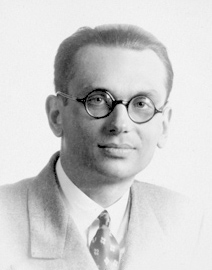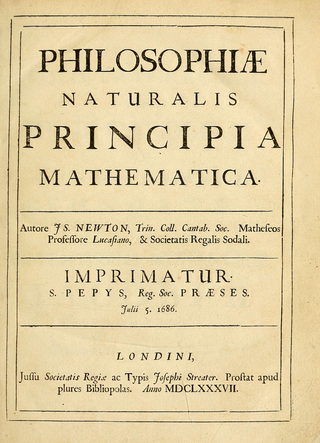Automated theorem proving is a subfield of automated reasoning and mathematical logic dealing with proving mathematical theorems by computer programs. Automated reasoning over mathematical proof was a major impetus for the development of computer science.

Kurt Friedrich Gödel was a logician, mathematician, and philosopher. Considered along with Aristotle and Gottlob Frege to be one of the most significant logicians in history, Gödel had an immense effect upon scientific and philosophical thinking in the 20th century, a time when others such as Bertrand Russell, Alfred North Whitehead, and David Hilbert were using logic and set theory to investigate the foundations of mathematics, building on earlier work by the likes of Richard Dedekind, Georg Cantor and Frege.

The Principia Mathematica is a three-volume work on the foundations of mathematics written by mathematician–philosophers Alfred North Whitehead and Bertrand Russell and published in 1910, 1912, and 1913. In 1925–1927, it appeared in a second edition with an important Introduction to the Second Edition, an Appendix A that replaced ✸9 and all-new Appendix B and Appendix C. PM is not to be confused with Russell's 1903 The Principles of Mathematics. PM was originally conceived as a sequel volume to Russell's 1903 Principles, but as PM states, this became an unworkable suggestion for practical and philosophical reasons: "The present work was originally intended by us to be comprised in a second volume of Principles of Mathematics... But as we advanced, it became increasingly evident that the subject is a very much larger one than we had supposed; moreover on many fundamental questions which had been left obscure and doubtful in the former work, we have now arrived at what we believe to be satisfactory solutions."

Alfred North Whitehead was an English mathematician and philosopher. He is best known as the defining figure of the philosophical school known as process philosophy, which today has found application to a wide variety of disciplines, including ecology, theology, education, physics, biology, economics, and psychology, among other areas.

Philosophiæ Naturalis Principia Mathematica often referred to as simply the Principia, is a book by Isaac Newton that expounds Newton's laws of motion and his law of universal gravitation. The Principia is written in Latin and comprises three volumes, and was first published on 5 July 1687.

Metamathematics is the study of mathematics itself using mathematical methods. This study produces metatheories, which are mathematical theories about other mathematical theories. Emphasis on metamathematics owes itself to David Hilbert's attempt to secure the foundations of mathematics in the early part of the 20th century. Metamathematics provides "a rigorous mathematical technique for investigating a great variety of foundation problems for mathematics and logic". An important feature of metamathematics is its emphasis on differentiating between reasoning from inside a system and from outside a system. An informal illustration of this is categorizing the proposition "2+2=4" as belonging to mathematics while categorizing the proposition "'2+2=4' is valid" as belonging to metamathematics.
PM or pm is an abbreviation for Latin post meridiem, meaning "after midday" in the 12-hour clock.
MathWorld is an online mathematics reference work, created and largely written by Eric W. Weisstein. It is sponsored by and licensed to Wolfram Research, Inc. and was partially funded by the National Science Foundation's National Science Digital Library grant to the University of Illinois at Urbana–Champaign.
Isaac Newton composed Principia Mathematica during 1685 and 1686, and it was published in a first edition on 5 July 1687. Widely regarded as one of the most important works in both the science of physics and in applied mathematics during the Scientific Revolution, the work underlies much of the technological and scientific advances from the Industrial Revolution which it helped to create.

Wolfram Research, Inc. is an American multinational company that creates computational technology. Wolfram's flagship product is the technical computing program Wolfram Mathematica, first released on June 23, 1988. Other products include WolframAlpha, Wolfram SystemModeler, Wolfram Workbench, gridMathematica, Wolfram Finance Platform, webMathematica, the Wolfram Cloud, and the Wolfram Programming Lab. Wolfram Research founder Stephen Wolfram is the CEO. The company is headquartered in Champaign, Illinois, United States.
Oskar Morgenstern was a German-born economist. In collaboration with mathematician John von Neumann, he founded the mathematical field of game theory as applied to the social sciences and strategic decision-making.
"Über formal unentscheidbare Sätze der Principia Mathematica und verwandter Systeme I" is a paper in mathematical logic by Kurt Gödel. Submitted November 17, 1930, it was originally published in German in the 1931 volume of Monatshefte für Mathematik. Several English translations have appeared in print, and the paper has been included in two collections of classic mathematical logic papers. The paper contains Gödel's incompleteness theorems, now fundamental results in logic that have many implications for consistency proofs in mathematics. The paper is also known for introducing new techniques that Gödel invented to prove the incompleteness theorems.

Ivor Owen Grattan-Guinness was a historian of mathematics and logic.
In computer science, in particular in knowledge representation and reasoning and metalogic, the area of automated reasoning is dedicated to understanding different aspects of reasoning. The study of automated reasoning helps produce computer programs that allow computers to reason completely, or nearly completely, automatically. Although automated reasoning is considered a sub-field of artificial intelligence, it also has connections with theoretical computer science and philosophy.
Mathematica Inc., formerly Mathematica Policy Research, is an American research organization and consulting company headquartered in Princeton, New Jersey. The company provides data science, social science, and technological services for social policy initiatives. Mathematica employs approximately 1,600 researchers, analysts, technologists, and practitioners in nine offices across the United States: Princeton, New Jersey; Cambridge, Massachusetts; Chicago, Illinois; Washington, DC; Ann Arbor, Michigan; Seattle, Washington; Woodlawn, Maryland; Tucson, Arizona and Oakland, California. In 2018, the company acquired EDI Global, a data research company based in the United Kingdom and Africa. Mathematica's clients include federal agencies, state and local governments, foundations, universities, private-sector companies, and international organizations.
The descending wedge symbol ∨ may represent:
Mathematical philosophy may refer to:
Mathematica Inc. was a multi-faceted American software company and consulting group founded by Princeton University professors in 1968. The computer had three primary divisions: Mathematica Policy Research, which did consulting work, mostly "to develop mathematical models for marketing decision making"; Mathematica Products Group, best known for developing RAMIS; and MathTech, the company's technical and economic consulting group. The company was also a leading developer of state lottery systems.





